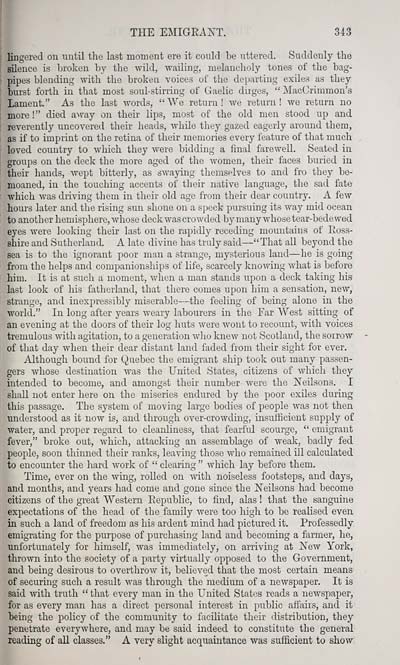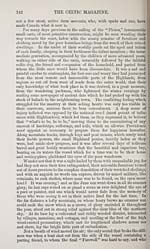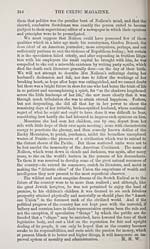Blair Collection > Celtic magazine > Volume 5
(353)
Download files
Complete book:
Individual page:
Thumbnail gallery: Grid view | List view

THE EMIGRAK"T. 343
lingered on until the last moment ere it could be uttered. Suddenly the
silence is broken by the \yild, wailing, melancholy tones of the bag-
pipes blending with the broken voices of the departing exiles as they
burst forth in that most soul-stirring of Gaelic dirges, " MacCrimmon's
Lament." As the last words, "We return! we return! we return no
more ! '"' died a^vay on their lips, most of the old men stood up and
reverently uncovered their heads, while they gazed eagerly around them,
as if to imprint on the retina of their memories every feature of that much
loved country to which they were bidding a final farewell. Seated in
groups on the deck the more aged of the women, their faces buried in
their hands, wept bitterly, as swaying themselves to and fro they be-
moaned, in the touching accents of their native language, the sad fate
which Avas driving them in their old age from their dear country. A few
hours later and the rising sun shone on a speck pursuing its way mid ocean
to another hemisphere, whose deck was crowded by many whose tear-bedewed
eyes were looking their last on the rapidly receding mountains of Eoss-
shire and Sutherland. A late divine has truly said — "That all beyond the
sea is to the ignorant poor man a strange, mysterious land — he is going
from the helps and companionships of life, scarcely knowing what is before
him. It is at such a moment, when a man stands upon a deck taking his
last look of his fatherland, that there comes upon him a sensation, new,
strange, and inexpressibly miserable — the feeling of being alone in the
world." In long after years weary labourers in the Far West sitting of
an evening at the doors of their log huts were wont to recount, with voices
tremulous with agitation, to a generation who knew not Scotland, the sorrow
of that day when their dear distant land faded from their sight for ever.
Although bound for Quebec the emigrant ship took out many passen-
gers whose destination was the United States, citizens of which they
intended to become, and amongst their number were the NeUsons. I
shall not enter here on the miseries endured by the poor exiles during
this passage. The system of moving large bodies of people was not then
understood as it now is, and through over-crowding, insutficieut supply of
water, and proper regard to cleanliness, that fearful scourge, " emigrant
fever," broke out, which, attacking an assemblage of weak, badly fed
people, soon thinned their ranks, leaving those who remained ill calculated
to encounter the hard work of " clearing " which lay before them.
Time, ever on the wing, rolled on Avith noiseless footsteps, and days,
and months, and years had come and gone since the K'eilsons had become
citizens of the great Western Eepublic, to find, alas ! that the sanguine
expectations of the head of the family were too high to be realised even
in such a land of freedom as his ardent mind had pictured it. Professedly
emigrating for the purpose of purchasing land and becoming a farmer, he,
unfortunately for himself, was immediately, on arriving at Xew York,
thrown into the society of a party virtually opposed to the Government,
and being desirous to overthrow it, believed that the most certain means
of securing such a result was through the medium of a newspap)er. It is
said with truth " that every man in the United States reads a newspaper,
for as every man has a direct personal interest in public affairs, and it
being the policy of the community to facilitate their distribution, they
penetrate everywhere, and may be said indeed to constitute the general
reading of aU classes." A very slight acquaintance was sufficient to show
lingered on until the last moment ere it could be uttered. Suddenly the
silence is broken by the \yild, wailing, melancholy tones of the bag-
pipes blending with the broken voices of the departing exiles as they
burst forth in that most soul-stirring of Gaelic dirges, " MacCrimmon's
Lament." As the last words, "We return! we return! we return no
more ! '"' died a^vay on their lips, most of the old men stood up and
reverently uncovered their heads, while they gazed eagerly around them,
as if to imprint on the retina of their memories every feature of that much
loved country to which they were bidding a final farewell. Seated in
groups on the deck the more aged of the women, their faces buried in
their hands, wept bitterly, as swaying themselves to and fro they be-
moaned, in the touching accents of their native language, the sad fate
which Avas driving them in their old age from their dear country. A few
hours later and the rising sun shone on a speck pursuing its way mid ocean
to another hemisphere, whose deck was crowded by many whose tear-bedewed
eyes were looking their last on the rapidly receding mountains of Eoss-
shire and Sutherland. A late divine has truly said — "That all beyond the
sea is to the ignorant poor man a strange, mysterious land — he is going
from the helps and companionships of life, scarcely knowing what is before
him. It is at such a moment, when a man stands upon a deck taking his
last look of his fatherland, that there comes upon him a sensation, new,
strange, and inexpressibly miserable — the feeling of being alone in the
world." In long after years weary labourers in the Far West sitting of
an evening at the doors of their log huts were wont to recount, with voices
tremulous with agitation, to a generation who knew not Scotland, the sorrow
of that day when their dear distant land faded from their sight for ever.
Although bound for Quebec the emigrant ship took out many passen-
gers whose destination was the United States, citizens of which they
intended to become, and amongst their number were the NeUsons. I
shall not enter here on the miseries endured by the poor exiles during
this passage. The system of moving large bodies of people was not then
understood as it now is, and through over-crowding, insutficieut supply of
water, and proper regard to cleanliness, that fearful scourge, " emigrant
fever," broke out, which, attacking an assemblage of weak, badly fed
people, soon thinned their ranks, leaving those who remained ill calculated
to encounter the hard work of " clearing " which lay before them.
Time, ever on the wing, rolled on Avith noiseless footsteps, and days,
and months, and years had come and gone since the K'eilsons had become
citizens of the great Western Eepublic, to find, alas ! that the sanguine
expectations of the head of the family were too high to be realised even
in such a land of freedom as his ardent mind had pictured it. Professedly
emigrating for the purpose of purchasing land and becoming a farmer, he,
unfortunately for himself, was immediately, on arriving at Xew York,
thrown into the society of a party virtually opposed to the Government,
and being desirous to overthrow it, believed that the most certain means
of securing such a result was through the medium of a newspap)er. It is
said with truth " that every man in the United States reads a newspaper,
for as every man has a direct personal interest in public affairs, and it
being the policy of the community to facilitate their distribution, they
penetrate everywhere, and may be said indeed to constitute the general
reading of aU classes." A very slight acquaintance was sufficient to show
Set display mode to: Large image | Transcription
Images and transcriptions on this page, including medium image downloads, may be used under the Creative Commons Attribution 4.0 International Licence unless otherwise stated. ![]()
| Early Gaelic Book Collections > Blair Collection > Celtic magazine > Volume 5 > (353) |
|---|
| Permanent URL | https://digital.nls.uk/76452935 |
|---|
| Description | Volume V, 1880. |
|---|---|
| Shelfmark | Blair.6 |
| Attribution and copyright: |
|
| Description | A selection of books from a collection of more than 500 titles, mostly on religious and literary topics. Also includes some material dealing with other Celtic languages and societies. Collection created towards the end of the 19th century by Lady Evelyn Stewart Murray. |
|---|
| Description | Selected items from five 'Special and Named Printed Collections'. Includes books in Gaelic and other Celtic languages, works about the Gaels, their languages, literature, culture and history. |
|---|

